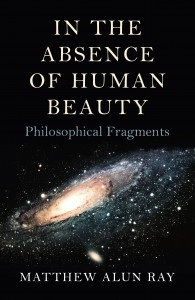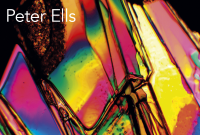
Philosophical Fragments
By Matthew Alun Ray
A collection of vivid fragments engaging with ethical and sceptical themes by means of an engagement with several major European thinkers, including Schopenhauer, Nietzsche, Levinas and Wittgenstein.
Extract
– Regina Olsen stands stock still, her eyes staring out of the window, silent, her clothes partially sunlit and her face strangely beautiful. ‘We become what we remember’, Plotinus counselled. (Or, as Gustave Flaubert might have said: she has her love story, like everyone else.) It remains true that, for good or for ill, we all display traces of the others who have passed through our lives, like secrets we have been forbidden to keep.
– Philosophical commentators predictably note that Kierkegaard’s invocation of inexpressive silence in Fear and Trembling – there are other kinds of silence – may be trying to tell Regina Olsen something. – Inwardness and concupiscence. All this to repulse Regina? Lessening her love for him in an act so betraying of and yet so dependent upon love that it is at once infinitely forgivable and yet bereft of any standard of expiation.
– We must imagine Søren Kierkegaard indoors, uttering her name in solitude.
– When Kierkegaard called his book Fear and Trembling he referred, in the first word of the title, to an “inner” emotion hidden from everybody (this is the element of private interiority and subjectivity that Kierkegaard was always so attached to) and, in the last word, to an eminently accessible, visibly expressive piece of behaviour. But is all you can see in trembling an indecipherable shaking? Or, rather, especially given, in addition, the contextual cues, don’t you perceive something physical that is already soaked with the meaningful? Aren’t you, in fact, seeing the fear itself? You are surely not involved in a process of inferring it. The meaning does not need to be inferred when the body is imbued with it.
– Will a “knowing smile” tell me that the Other knows something? Answer: Yes.
– When he collapses with grief, his grief is already here in the room (right here in his expressions and in his vocalisations) and is most certainly not ensconced away at the heart of the inner. You almost immediately console him, as best you can. Pity, Wittgenstein wrote, is a form of conviction.
– We enter, as inexorably as fate, into the tedium of completion – the silence maintained by the pitiful dead.
Matthew Alun Ray was educated at Bristol University, then the University of Warwick, where he received his PhD in philosophy. Ray has previously published "Subjectivity and Irreligion" and essays in journals on topics that include Heidegger and Nietzsche.
 In the Absence of Human Beauty will be published by Iff Books,
30th October 2015. ISBN: 978-1-78279-927-6 (Paperback) £7.99 $11.95, EISBN: 978-1-78279-926-9 (eBook) £4.99 $7.99.
In the Absence of Human Beauty will be published by Iff Books,
30th October 2015. ISBN: 978-1-78279-927-6 (Paperback) £7.99 $11.95, EISBN: 978-1-78279-926-9 (eBook) £4.99 $7.99.
eBook
Paperback
Categories:
0 comments on this article







